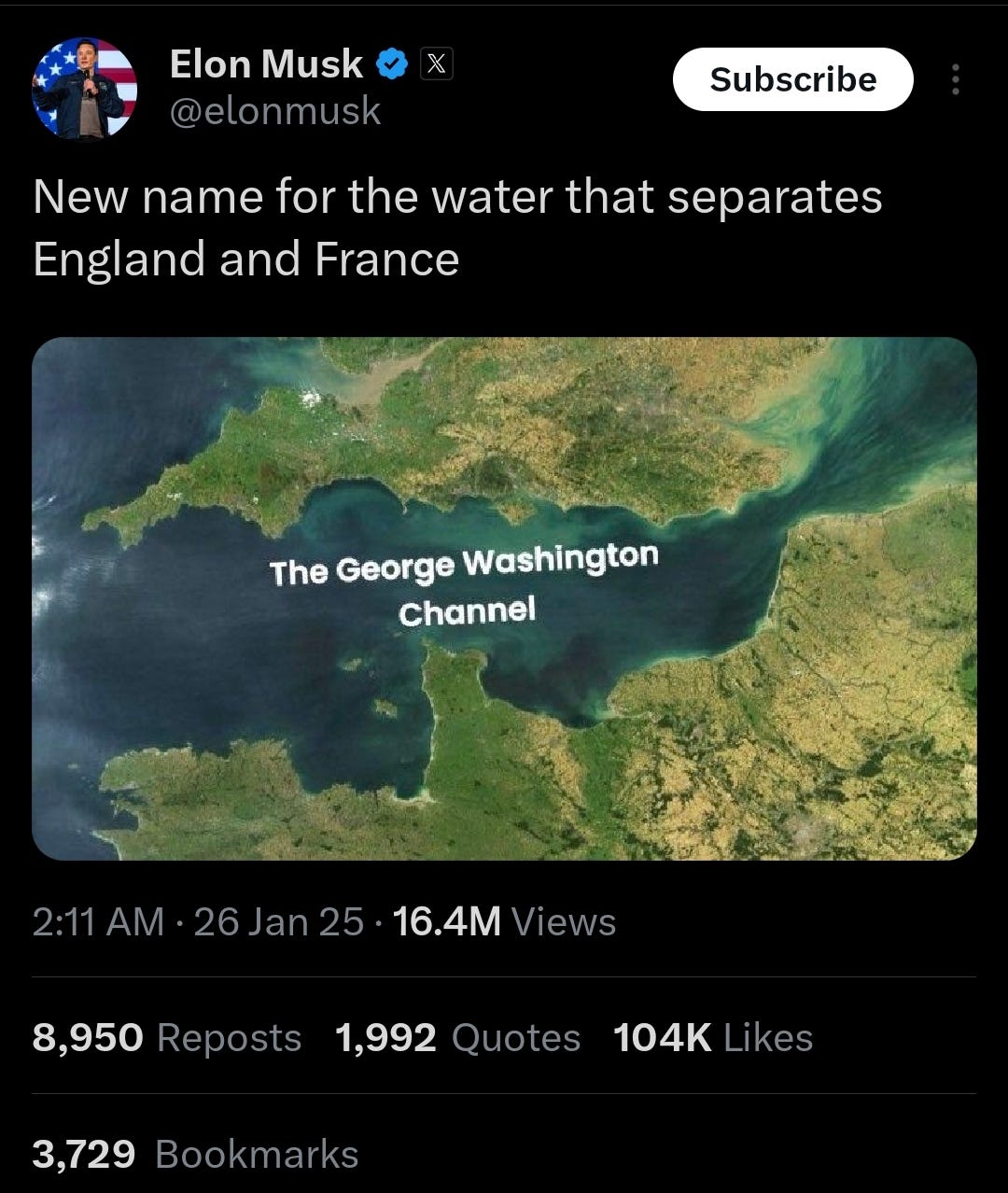Checkmate
Making Nationalism Great Again
In the chess game of global politics, two players have recently made moves so audacious that they've not only shaken the board but also revealed the true colors of many pawns and kings alike. Donald Trump, the 47th President of the United States, and Elon Musk, the world's richest individual, have ignited a firestorm of controversy with their bold, often meme-laden comments about international sovereignty, borders, and national interests. Their provocative statements have stirred a pot of nationalism that's simmering on the global stage, forcing a reevaluation of what it means to defend one's nation.
The Art of Provocation
Trump's jesting about renaming the Gulf of Mexico to "Gulf of America," or his whimsical musings on buying Greenland and annexing Canada, alongside Musk's recent post about renaming the English Channel the George Washington Channel, have been met with a mixture of outrage and amusement.
Critics decry these as brash oversimplifications of complex geopolitical relationships, yet there's an undeniable brilliance to this strategy.
As I've noted on X, "I keep laughing as I watch people get butthurt over
and
statements about renaming bodies of water, buying Greenland, or annexing Canada, etc. First of all, it is long overdue for the world to take a chill pill and recognize some humor for a change." This humor, however, serves a deeper purpose. It's not just about political incorrectness in a "woke generation"; it's a masterstroke in political strategy.
The Mirror of Hypocrisy
The backlash to these provocations has been swift, but in their fervor, world leaders inadvertently reveal their own nationalist streaks. When Denmark rebuffs Trump's playful proposal to purchase Greenland, or when Canadian officials bristle at the notion of becoming a U.S. state, they do so on the grounds of national sovereignty—a principle they criticize Trump for championing in America.
This is where the checkmate comes into play. By pushing these buttons, Trump and Musk have forced a global dialogue where leaders must defend their national interests while simultaneously critiquing Trump for the same. As I further stated, "Next, they are forcing world leaders to show their hypocrisy as they demand respect for their national sovereignty, national borders, and national interests. It makes it a little harder for them to criticize Trump for wanting the same."
The #MakeNationalismGreatAgain Movement
This dynamic is not just about exposing hypocrisy; it's part of a broader narrative to normalize, or at least reframe, nationalism in the public discourse. Trump's #ArtOfTheDeal approach to politics has always been about leveraging situations to his advantage, and here, he's turning the tables on global critics. If nationalism is good for one, why not for all?
Musk, on the other hand, with his global influence and tech empire, amplifies this message through his platforms and endorsements, subtly shifting the conversation from the fringes to the mainstream. Their combined actions suggest that nationalism isn't the relic of a bygone era but a vibrant, if controversial, force in modern geopolitics.
Conclusion
In conclusion, the chess game played by Trump and Musk with their provocative comments isn't just about stirring the pot; it's about redefining the game itself. They've managed to bring the topic of nationalism from the shadows into the spotlight, making everyone from world leaders to the average citizen confront their views on sovereignty, borders, and national identity.
It's past time someone started pushing a narrative that asks the world to look in the mirror. In doing so, they've masterfully turned the tables, making it harder for critics to denounce nationalism in one breath while defending it in another. Whether you agree with their tactics or not, one thing is clear: the conversation has changed, and in the world of politics, that's often the first move towards checkmate.


